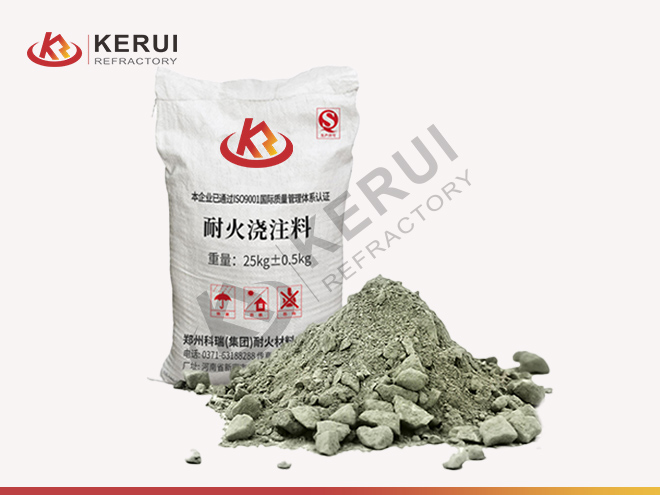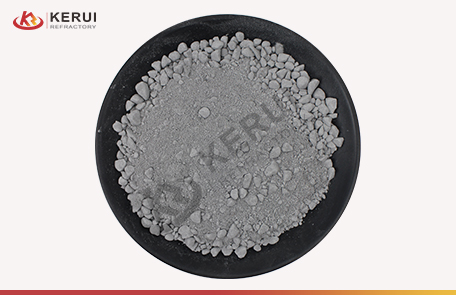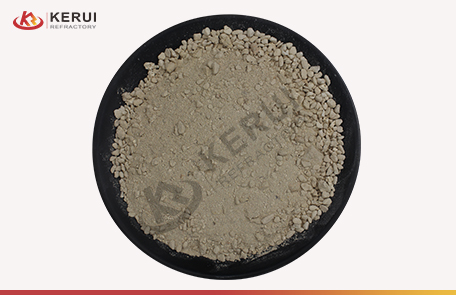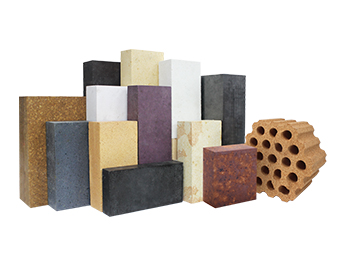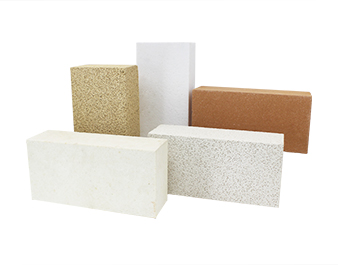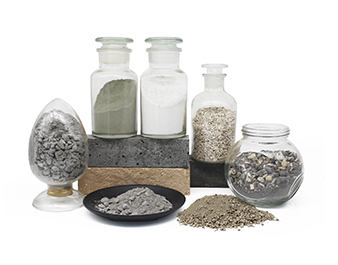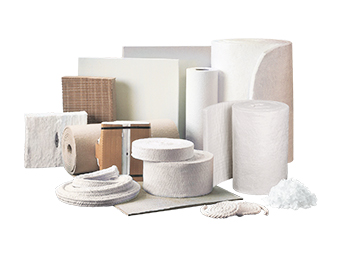Refractory Castables for Sale
Kerui refractory castables are made of refractory aggregate, refractory powder, binder, and other additives, and can be used directly or by adding the appropriate amount of water or other liquids. Once cast or gunned into place, the castable material hardens and cures to form a solid and durable refractory lining. Refractory castables can be installed using different methods depending on the specific application and equipment. Such as casting, gunning, troweling, and pumping.

Al2O3%: 40-95
Bulk Density: (g/cm³): 1.8-2.5
Compressive Strength: (MPa): 20-150
Max Service Temperature: (℃): 1300-1800
Sample: testing of sample is available
Classifications of KERUI Refractory Castable
Applications Of Kerui Refractory Castable
Refractory castable is a special material with high-temperature resistance, corrosion resistance, and wear resistance. It can protect equipment from high temperature, corrosion, and wear, ensuring the normal operation of production equipment and the safety of personnel and property.
Cement & Lime, Refractory castables are mainly used in cement plants including the thermal insulation lining; Refractory castables are usually used in lime rotary kiln preheaters and front and rear kiln mouths.
refractory castables are mainly used in high-temperature furnaces, such as steel smelting furnaces, aluminum electrolytic cells, glass melting furnaces, etc.
refractory castables are mainly used for the lining of various chemical reactors and storage tanks.
refractory castables can be used in the lining of electric boilers and kilns to withstand combustion under high temperature and pressure conditions.
-
Cement & Lime
-
Metallurgical Industry
-
Chemical Industry
-
Power Station
Advantage of Refractory Castables

The lightweight aggregates and particles in the refractory castables reduce heat transfer and provide excellent thermal insulation properties that reduce heat loss and improve energy efficiency in furnaces and other heat treatment equipment. Welcome to inquire at Kerui, we will provide you with the best quality products with reasonable price.
Refractory castables are usually made with high-performance binding agents and fine-grained aggregates that are properly mixed and cured to form a high-strength structure. This high strength allows the refractory castables to withstand mechanical and thermal stresses at high temperatures, maintaining the structural stability and integrity of the furnace.
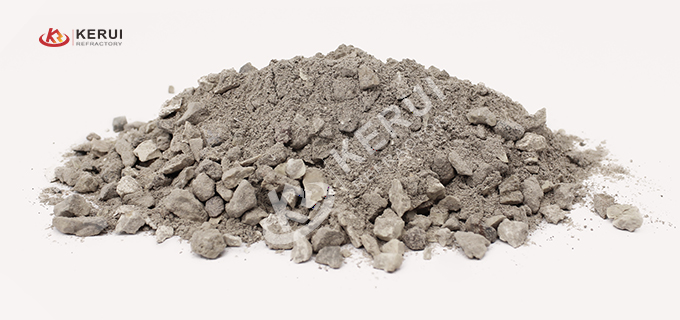

Castables are suitable for different equipment shapes and size requirements. They can be customized to specific shapes and configurations, they can be quickly poured, sprayed, or smoothed to meet the needs of a wide range of equipment and processes, and they are easy to construct. Welcome to visit Kerui factory, we will provide you with the best service.
Fire-resistant castables can be made with aggregates and binders that have good resistance to chemical attacks. These materials are resistant to corrosive media such as molten metals, acid and alkali solutions, and corrosive gases. They protect equipment from erosion by acids and bases, corrosive gases, and molten metals. Welcome to Inquiry.

Production Process of Refractory Castables
Kerui is a professional refractory material manufacturer. First of all, we have advanced production equipment, technology, laboratories, and strict quality inspection departments to ensure the high quality of our products. Secondly, we provide customized services and develop customization according to customer needs. In addition, we have professional pre-sales and after-sales teams that can provide customers with integrated solutions, products, and construction solutions.

Certificates Of Kerui Refractory
Kerui Group has a number of international certifications, such as, ISO9001/ISO14001/OHSAS18001/CE/SGS. Besides,
Kerui’s products also have many domestic certificates, the quality is very guaranteed, and they have been unanimously recognized by customers at home and abroad.

Kerui Refractory Products Packaging & Shipping
The entire delivery process is tracked, and Kerui’s expert team solves specific project needs with the utmost professionalism.
If the customer’s project requires it, Kerui’s expert team will go to the customer’s country to provide face-to-face technical support.
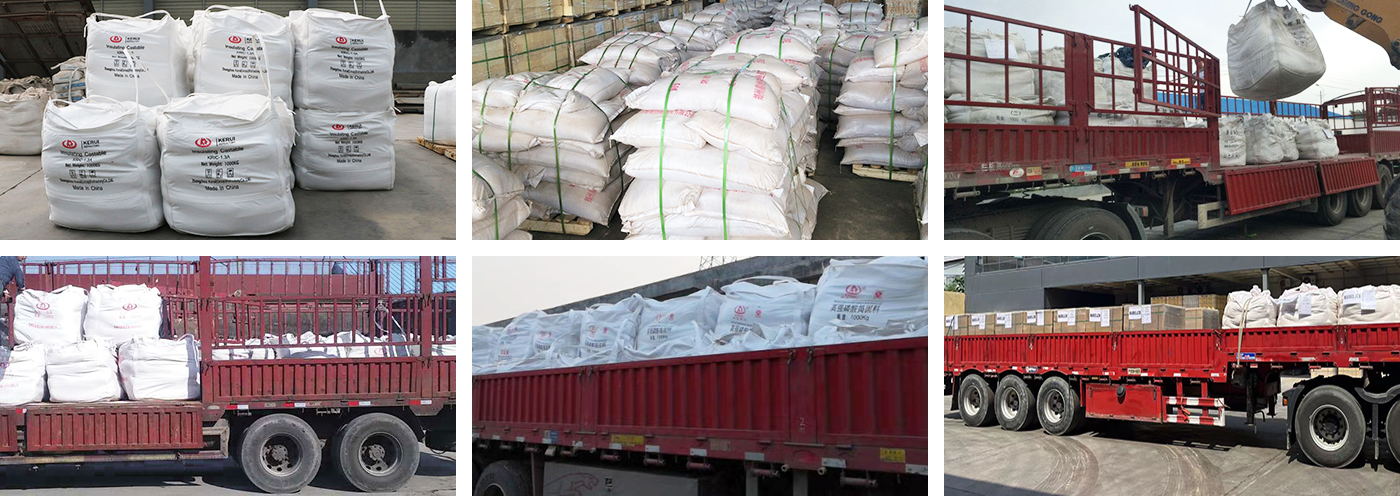
Customer Case Of Kerui Refractory
Besides mainland China, Kerui Refractory has exported products to more than 50 countries and regions across 5 continents across the world, including Asia, Europe, America, Africa and Oceania.
We have received recognition and high praise from customers all over the world, and are constantly receiving customers’ repeat orders and referrals.
-
5Continents
-
50+Continents
-
1700+Continents
-
4500+Continents
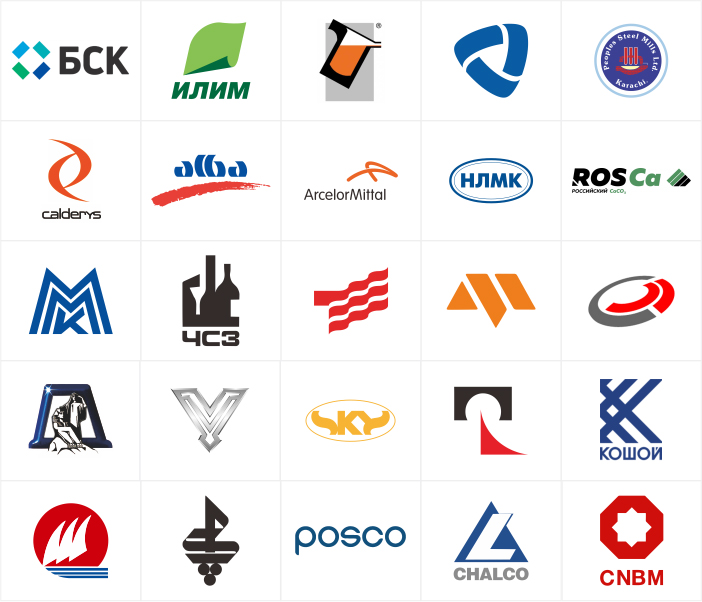
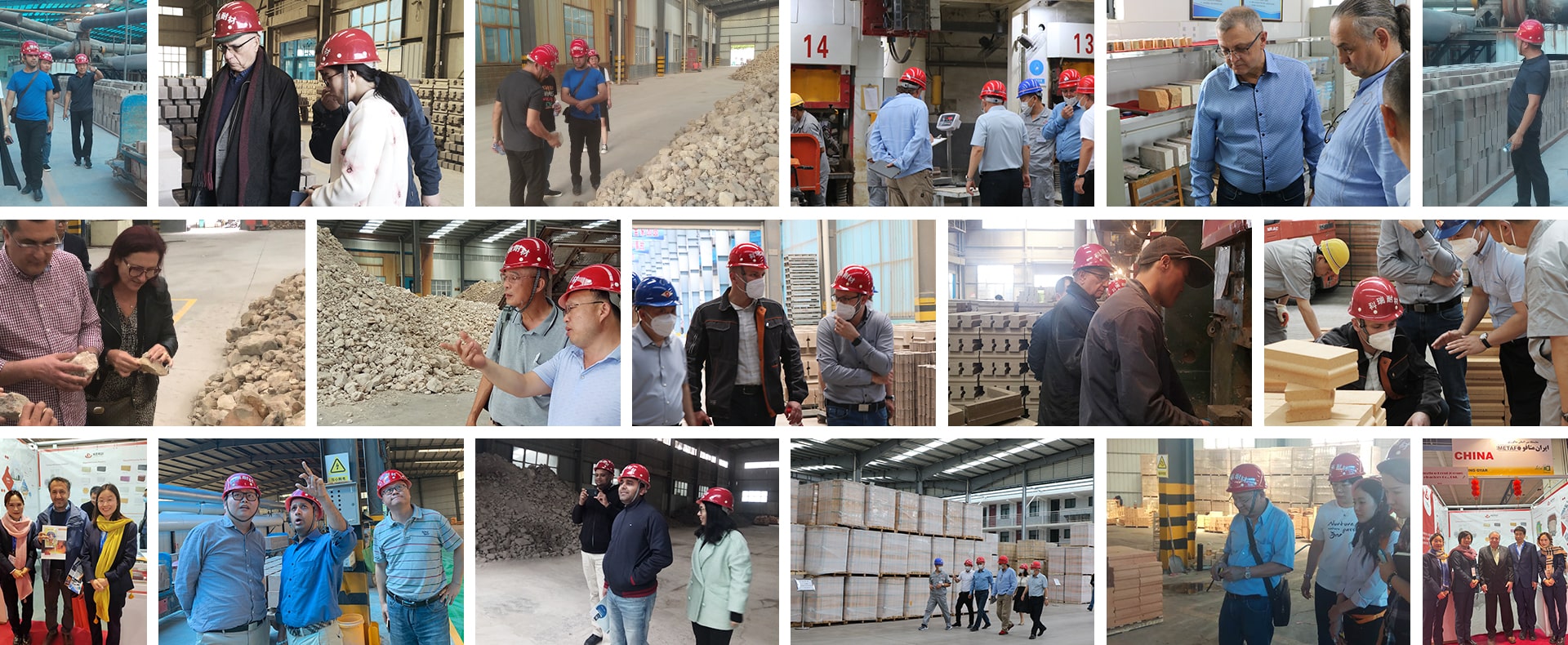
| Item/Grade | GLJ-50 | GLJ-60 | GLJ-65 | GLJ-70 | GLJ-80 | |
|---|---|---|---|---|---|---|
| ω (Al2O3) ≥/% | 50 | 60 | 65 | 70 | 80 | |
| Refractoriness ≥/℃ | 1700 | 1720 | 1720 | 1720 | 1780 | |
| Bulk Density ≥/ (g/cm³) | 110℃*24h | 2.15 | 2.30 | 2.40 | 2.45 | 2.65 |
| Cold Modulus of Rupture ≥/MPa | 4.0 | 5.0 | 6.0 | 6.0 | 7.0 | |
| Cold Crushing Strength ≥/Mpa | 25 | 30 | 35 | 35 | 40 | |
| Permanent Linear Change (T/℃*3h)/% | ±0.8 (1350℃) |
±0.8 (1400℃) |
±0.8 (1500℃) |
|||
| Item/Grade | Clay | High Alumina | Corundum |
|---|---|---|---|
| ω (Al2O3) ≥/% | 45 | 75 | 92 |
| ω (SiO2) ≥/% | 50 | 12 | 5 |
| ω (CaO) | 1.8 | 1.5 | 1.5 |
| Bulk Density(g/cm3) | 2.3 | 2.6 | 3 |
| Cold Crushing Strength/Mpa | 72 | 75 | 85 |
| Permanent Linear Change/±% | 0.3 | 0.5 | 0.5 |
| Max Service Temperature/℃ | 1450 | 1600 | 1700 |
| Water Needed/% | 6.0-6.5 | 6.0-6.5 | 4.0-5.0 |
| Item/Grade | SICAST 85 | SICAST 80 | SICAST 60 | ||
|---|---|---|---|---|---|
| Physical Properties | Required Quantity (t/m3) | 2.68 | 2.6 | 2.5 | |
| Water Required for Casting (%) | 45084 | 45084 | 45115 | ||
| CCS (kg/cm2) | @ 110℃x24h | 650(140) | 500(90) | 450(70) | |
| @ 1000℃x3h | 850(150) | 600(150) | 550(100) | ||
| @ 1350℃x3h | 1100(250) | 1000(250) | 1000(250) | ||
| PLC (%) | @ 110℃x24h | -0.06 | -0.06 | -0.06 | |
| @ 1000℃x3h | -0.1 | -0.1 | -0.2 | ||
| @ 1350℃x3h | -0.1 | -0.1 | -0.12 | ||
| TC (kcal/mh℃) | @ 350℃ | 11.5 | 11 | 8 | |
| Chemical Properties | ω (Al2O3)/% | 9 | 9 | 20 | |
| ω (SiC + C)/% | 83 | 78 | 58 | ||
| Item/Grade | NS-1.6 | NS-1.8 | NS-2.0 |
|---|---|---|---|
| ω (SiO2) ≥/% | 45 | 48 | 52 |
| Bulk Density ≥/ (g/cm³) | 1.6 | 1.8 | 2.0 |
| Cold Crushing Strength ≥/MPa | 5 | 8 | 10 |
| Acid Resistance ≥/% | 95 | 95 | 95 |
| Thermal Conductivity Coefficient ≤ /[W/(m·K)] (350±25℃) | 0.5 | 0.55 | 0.60 |
| Service Temperature/℃ | 800 | 900 | 1000 |
| Item/Grade | KR-1 | KR-2 | KR-3 | |
|---|---|---|---|---|
| ω (Al2O3) /% | 70 | 75 | 85 | |
| ω (SiO2) /% | 25 | 17 | 13 | |
| ω (Fe2O3) /% | 1 | 1 | 1 | |
| Bulk Density (g/cm3) | 2.7 | 2.8 | 2.9 | |
| Cold Crushing Strength/MPa | 110℃*24h | 100 | 110 | 120 |
| 1100℃*3h | 100 | 110 | 125 | |
| 1400℃*3h | 115 | 120 | 15 | |
| Cold Modules of Rupture/MPa | 110℃*24h | 15 | 15 | 18 |
| 1100℃*3h | 16 | 17 | 19 | |
| 1400℃*3h | 17 | 18 | 5 | |
| Normal Temperature Wear/cm3 | 7 | 6 | 1500 | |
| 0.2Mpa Refractoriness Under Load/℃ | 1450 | 1480 | 25 | |
| Max Service Temperature/℃ | 1550 | 25 | 1600 | |
| Permanent Linear Change/% | 1300℃*3h | -0.3 | -0.2 | -0.2 |
| Item/Grade | F1 | F2 | F3 | |
|---|---|---|---|---|
| ω (Al2O3) ≥/% | 80 | 70 | 65 | |
| Room Temperature Flexural Strength ≥/Mpa | 110℃*24h After Drying | 12.0 | 10.0 | 9.0 |
| 1110℃*3h After Drying | 12.0 | 10.0 | 6.5 | |
| Normal Temperature Compressive Strength ≥/Mp | 110℃*24h After Drying | 90 | 80 | 70 |
| 1110℃*3h After Drying | 90 | 80 | 50 | |
| 1110℃Flexural Strength After 5 Times of Water Quenching And Rapid Heating Cycles at Room Temperature/Mp ≥ | 5.5 | 5 | 5 | |
| Permanent Linear Change/% | 1110℃*3h After Burning | ±0.5 | ±0.5 | ±0.5 |
| Item/Grade | GJ80 | GJ90 | GJ95 |
|---|---|---|---|
| ω (Al2O3) ≥/% | 80 | 90 | 95 |
| Bulk Density ≥/ (g/cm³) | 2.7 | 2.8 | 3.2 |
| Flexural Strength ≥/MPa | 9 | 10 | 11 |
| Compressive Strength ≥/MPa | 60 | 60 | 60 |
| Permanent Linear Change ≤/% | ±0.5 | ±0.5 | ±0.5 |
| Item/Grade | KRMJ-55 | KRMJ-60 | KRMJ-65 | KRMJ-70 |
|---|---|---|---|---|
| ω (Al2O3) ≥/% | 55 | 60 | 65 | 70 |
| Bulk Density ≥/ (g/cm³) | 2.3 | 2.4 | 2.5 | 2.6 |
| Flexural Strength ≥/MPa | 7 | 7 | 8 | 9 |
| Compressive Strength ≥/MPa | 40 | 50 | 60 | 70 |
| Permanent Linear Change ≤/% | ±0.5 | ±0.5 | ±0.5 | ±0.5 |
| Item/Grade | QJ-0.5 | QJ-0.8 | QJ-1.0 | QJ-1.1 | QJ-1.3 | QJ-1.5 | QJ-1.8 | |
|---|---|---|---|---|---|---|---|---|
| Bulk Density (g/cm³) | 0.5 | 0.8 | 1.0 | 1.1 | 1.3 | 1.5 | 1.8 | |
| Max. Service Temperature/℃ | 1150 | 1200 | 1250 | 1250 | 1300 | 1300 | 1350 | |
| Thermal Conductivity Coefficient ≤/[W/(m·K)] | 350℃ | 0.15 | 0.25 | 0.3 | 0.4 | 0.45 | 0.6 | 0.65 |
| 700℃ | 0.20 | 0.30 | 0.4 | 0.45 | 0.5 | 0.7 | 0.75 | |
| Cold Crushing Strength ≥/MPa | 110℃*24h | 1.5 | 2.0 | 4.0 | 5.5 | 10 | 15 | 20 |
| 1000℃*3h | 1.5 | 2.0 | 5.5 | 6.5 | 15 | 20 | 30 | |
| Permanent Linear Change (1000℃*3h)/% | -1.5 | -1.0 | -1.0 | -0.5 | -0.5 | -0.5 | -0.5 | |
